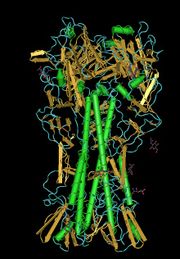- Lectin
-
Lektine sind komplexe Proteine oder Glykoproteine, die spezifische Kohlenhydratstrukturen binden und dadurch in der Lage sind, sich spezifisch an Zellen bzw. Zellmembranen zu binden und von dort aus biochemische Reaktionen auszulösen. Sie haben jedoch keine enzymatische Aktivität. Lektine sind ubiquitär, man findet sie bei Tieren, Pflanzen und Mikroorganismen.
Lektine können verschiedene Stoffwechselvorgänge wie die Zellteilung, die ribosomale Proteinbiosynthese, die Agglutination von Zellen (daher die alte Bezeichnung Hämagglutinine; Lektin kommt von lat. legere = lesen, auswählen) oder das Immunsystem beeinflussen.
Inhaltsverzeichnis
Vorkommen
Lektine stammen zumeist aus Pflanzen, können aber auch tierischen oder bakteriellen Ursprungs sein. Dazu zählen z. B. hochmolekulare Samenglykoproteide wie das Rizin oder bakterielle Toxine wie das Shiga-Toxin, Vero-Toxin, Diphtherietoxin, Exotoxin A oder alpha-Sarcin. Lektine sind in der Regel an der äußeren Membranoberfläche angelagert. Sie sind von komplexer Struktur. Daraus kann geschlossen werden, dass sie informationsreiche Moleküle sind. Zudem weiß man, dass sie der Kommunikation und Interaktion von Zellen und Organismen dienen. So sind sie in vielen Erkennungsprozessen beteiligt. So können sich mit Hilfe der Lektin-Polysaccharid-Interaktion Bakterien wie das Rhizobium trifolii an die Wurzeln von Klee haften. Mit der Erkennung wird die Symbiose von Wurzelknöllchenbakterien und Leguminosen erst möglich. Ähnliche Erkennungsmechanismen (Lektine-Polysaccharide) spielen bei der Befruchtung der menschlichen Eizelle ebenfalls eine Rolle. Am bekanntesten sind vor allem Lektine pflanzlichen Ursprungs, z. B. das Phasin aus rohen Gartenbohnen, welches durch Kochen zerstört werden kann. Andere Lektine sind resistenter gegenüber Hitze, aber oft auch nicht toxisch, z. B. Lektine aus der Kartoffel. Der Verdauungstrakt des Menschen ist Lektinen regelmäßig ausgesetzt.
Ein Beispiel für ein Lektin ohne Zuckerrest ist Concanavalin A aus den Samen der Jackbohne Canavalia ensiformis. Weitere Beispiele für Lektine sind Calnexin und Calreticulin, die als Chaperone bei der Proteinfaltung dienen.
Biologische Wirkung
In ihrer Wirkungsweise ähneln Lektine oftmals den Antibiotika. So ist Rizin ein potenter Hemmer der ribosomalen Proteinbiosynthese. Zum Teil wirken Lektine toxisch auf Kleinlebewesen und finden somit Verwendung als Pflanzenschutzmittel gegen Insekten. Durch die Agglutination von Blutzellen kann es auch zu Verklumpungen kommen, welche die Blutbahnen verstopfen.
Literatur
- Voet, D., Voet, J. G., Biochemistry, Wiley Intl. Edition, Wiley, 2004
- Stryer, L. et al., 1996 Biochemie, Brock Mikrobiologie 2001
Weblinks
Wikimedia Foundation.

